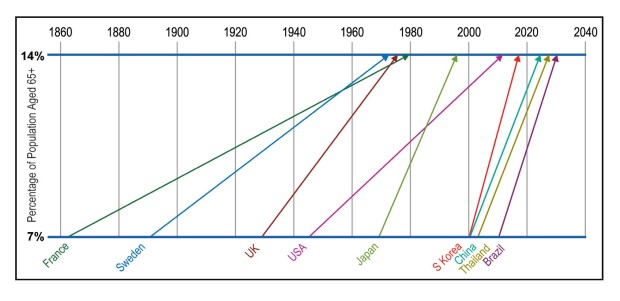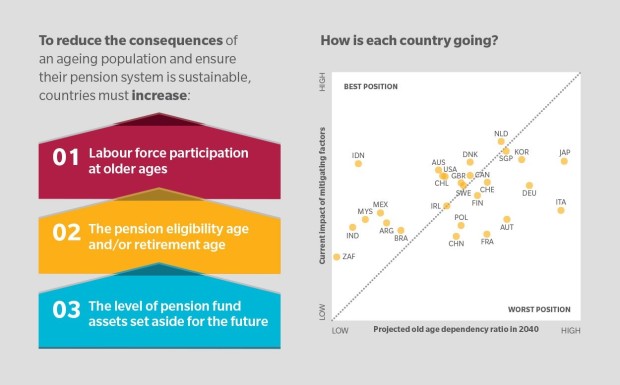Written by Rainald Baier da Silva and Isabelle Gómez Truedsson, Embassy of Switzerland in Brazil
In Brazil, the eternal “país do futuro” (Portuguese: land of the future), the aging society is becoming an urgent issue: According to the Brazilian Institute of Geography and Statistics (IBGE), there are currently 22 million people above the age of 60 living in Brazil. This corresponds to roughly 11% of the entire population of 206 million. By 2050, their share will have reached 25% of the population. The general trend is thus the same as in developed and other emerging countries: Brazilians tend to live longer and have fewer children. However, the numbers provided by the National Health Research 2013 show, that Brazil is aging at a much quicker rate than countries like Sweden or the United Kingdom (see graph below).

Brazil is predicted to age quicker than other countries. This graph shows how long it takes for each country to reach a proportion of 14% of elderly as part of the entire population. Source: Kinsella K, He W. An Aging World: 2008. Washington, DC: National Institute on Aging and U.S. Census Bureau, 2009.
Public health for all − in principle
The first step towards a national policy for the 60+ group was taken in 1994, when the first National Policy for the Elderly was launched. In 2002, Brazil adopted the guidelines for aging societies published by the World Health Organization, whose key elements are health, participation in society, security measures to protect people over 60 from violence and discrimination, as well as assuring social, physical and financial security. Since 2006, the current National Policy for the Elderly has been implemented, aiming to promote more autonomy and independence.
The Brazilian public health system (Sistema Único de Saúde, SUS) is the main tool to reach this goal: It is one of the largest of its kind in the world and the only one to be entirely free of charge for the whole population, including foreign residents. 70% of Brazil’s elderly depend completely on public health care. However, not much money has been directed towards the preparation for the needs of an aging society during the last decade. Instead, the actions aimed at preventing diseases and providing limited access to free medical treatment for the 60+ age group are threatened by severe budget restrictions. Despite this, the Brazilian government succeeded to implement some innovative measures so far:
To attract public attention towards the needs of the elderly, the Brazilian government launched the Open University of the SUS. The first module on care of the elderly was offered free of charge from July until November 2016, with further modules coming up in 2017. Any interested person can apply for courses and there are already over 13’000 enrolled citizens. With this program, Brazil wants to improve the quality of informal care.
Another measure implemented by the SUS is the health booklet for elderly persons called “caderneta de saúde da pessoa idosa”, providing a complete health evaluation, identifying vulnerabilities and offering orientation for self-care. The booklets are not only used by the paid and unpaid caregivers, but also by the elderly themselves. The booklet is an attempt to provide a tool to attend to all demands by means of a unified system.

The “caderneta de saúde da pessoa idosa”.
Finally, the Brazilian government wants to keep old people fit and independent, amongst others by providing gyms for the third age[1] in public places.
Despite the generally accessibly public health system, social inequality persists and senior citizens do not dispose of the same means to keep their autonomy and take care of themselves. The elderly are an extremely heterogeneous group and health care does not reach all of them. In total, there are currently 6.5 million Brazilians in need of assistance to accomplish their daily activities, yet 360.000 of them do not receive any help to perform them. 81% are being taken care of by relatives, of which 62% are family members, who reside in the same home as the elderly. This is in strong contrast to the situation in European countries, where nursing homes are the norm.
Since senior citizens will soon represent a quarter of the population, and given the fast reduction of informal caregiving due to a reduced family size and the increasing participation of women in the labor market, Brazil needs an urgent solution, especially for the elderly poor.
More information and professional training needed
According to Elizabete Bonavigo, Social Policy Analyst at the Brazilian Ministry of Health, more research is needed to improve health services. Furthermore, the government should provide professional training for caregivers to improve the quality of health services.
To gather information on the health condition of elderly adults and their needs, the Ministry of Health and the Oswaldo Cruz Foundation started to collect data on senior citizens in 2015. The Brazilian longitudinal study of aging and well-being (ELSI)[2] is being conducted by Professor Maria Fernanda Lima-Costa from the Oswaldo Cruz Foundation in the state of Minas Gerais. The scientific findings will provide strategic information to help the Brazilian Ministry of Health to develop policies to promote successful aging and to improve the quality of health. The study is ongoing and the first results are expected to be published soon.
Pension system strains funds available for public health
The group of the elderly in Brazil is growing fast and politicians will no longer be able to ignore their needs. However, it is questionable whether the government will be able to continue to offer public health services for everyone. Although health is a fundamental right according to the Brazilian Constitution of 1988, there is a lot of skepticism about the future of health policies. This is further reinforced by the currently ongoing debate on cutting spending in the health and education sector. Brazil lives its second year of recession in a row and the government’s budget is thus heavily strained. One item, which particularly burdens the budget and directly concerns the elderly, are the pensions. In the Melbourne Mercer Global Pension Index (MMGPI)[3], which is produced by Mercer and the Australian Center for Financial Studies (ACFS), Brazil is ranked 16th out of 27 countries regarding adequacy, sustainability and integrity of its pension system.

In 2016, the MMGPI looked at the impact of rapidly aging populations on countries’ retirement systems and their ability to deal with the financial implications.
Brazil is expected to reform its expensive pension system by 2017 to rebalance its national budget, with drastic consequences for life plans of most Brazilians. The government is considering fixing the minimum retirement age at 65 for men and 60 for women as well as increasing the mandatory years of contribution− highly necessary, but very unpopular measures. But even with this reform, Brazil will only be at the point, where European countries are today with regard to adequacy of the pension system. Given the extremely fast-paced demographic transition in Brazil, the current reform plans will most likely not be sufficient to make the system sustainable again.
The Brazilian government thus sees itself confronted with important challenges at different fronts and 2017 will be a decisive year for reforms in the health, education and pension system. Still, the measures in favor of the elderly implemented so far such as the SUS, health booklet or the free courses on caregiving are important steps towards making health more available for everyone. Looking ahead, one thing is clear: Just like in most other countries, the “third age”, as it is referred to in Brazil, will be a key issue when discussing quality of life, healthcare and sustainability in the future.
***
[1] https://globalstatement.wordpress.com/2016/08/12/aging-societies-in-brazil-the-view-of-a-developing-country-its-needs-and-its-possibilities/
[2] http://elsi.cpqrr.fiocruz.br/en/
[3] http://www.mercer.com/our-thinking/mercer-melbourne-global-pension-index.html